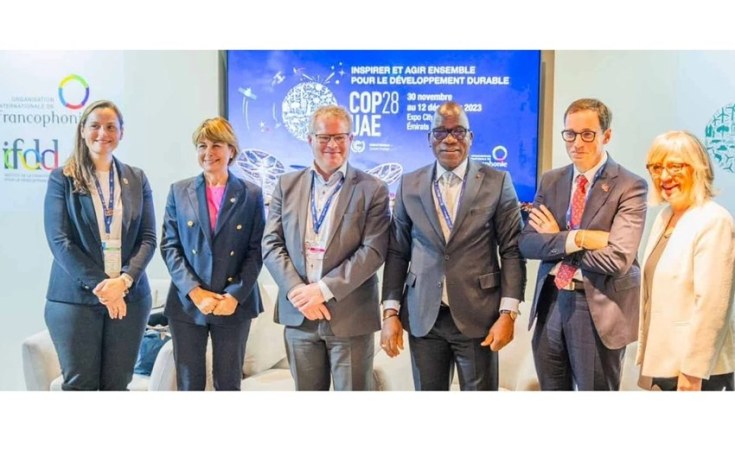French-speaking countries in Africa face two injustices in climate negotiation bodies. On the one hand, they are on the continent that is most vulnerable to climate change while producing the lowest proportion of global greenhouse gas emissions (less than 4 percent); on the other, climate finance bodies are largely dominated by English speakers, placing the francophone countries at a linguistic disadvantage in their national efforts to mobilize.
This observation was one of the findings shared during a high-level consultation of ministers from French-speaking countries on the issues around mobilizing climate funding, organized by the International Organisation of La Francophonie (OIF) on 9 December 2023, alongside the 28th UN Climate Change Conference (COP28).
The consultation on "the French language supporting increased access to climate finance" gave ministers and heads of delegations an opportunity to identify solutions that would give the French language a greater role in climate negotiations and give French-speaking developing countries better access to climate finance.
The participants in this high-level consultation of French-speaking countries in Dubai made a number of recommendations.
"Climate justice needs language justice!" stated OIF administrator Caroline Saint-Hilaire. "We need to send a strong message to our heads of state as well as to our ministers and representatives, to start speaking in French rather than English in the different climate negotiation bodies."
Various speakers also insisted on the necessity for French-speaking countries to work strategically. This means learning from one other and emphasizing the solidarity among those that are successful in mobilizing funding and those that are not. This same solidarity needs to extend to the sponsors of green projects as they try to achieve an acceptable level of access to climate finance for French-speaking countries.
Participants also shared a proposal to instigate and strengthen high-level advocacy aimed at French-speaking heads of state for easier access to climate finance, looking ahead to the next Paris Summit on climate finance for developing countries.
Arona Soumare, the African Development Bank's focal point for the United Nations Framework Convention on Climate Change (UNFCCC), emphasized that nine of the world's ten countries most vulnerable to climate change are in sub-Saharan Africa, of which five are French speaking. Hence the necessity of covering the language gap to allow them to access more resources. "Most climate funding requires a long, complex application process, which is only available in English. That creates problems for countries with limited capacity, especially the least developed French-speaking countries in Africa. It is therefore important to advocate so that French-speaking countries can submit projects in their own language to all funding windows of institutions such as the Green Climate Fund," emphasized Mr Soumare. He also referred to the Climate Action Window, which was launched successfully at COP28 on 4 December 2023, to speed up adaptation actions to support the 37 least-developed countries in Africa, of which 18 are French-speaking.
Aware that climate finance is a major issue for the full implementation of the Paris Agreement, the Principality of Monaco, represented by Ms Isabelle Berro-Amadeï, Minister of Foreign Affairs and Cooperation, praised the extension of the country's partnership with the Institute of La Francophonie for Sustainable Development to support French-speaking stakeholders in their access to climate funding.


